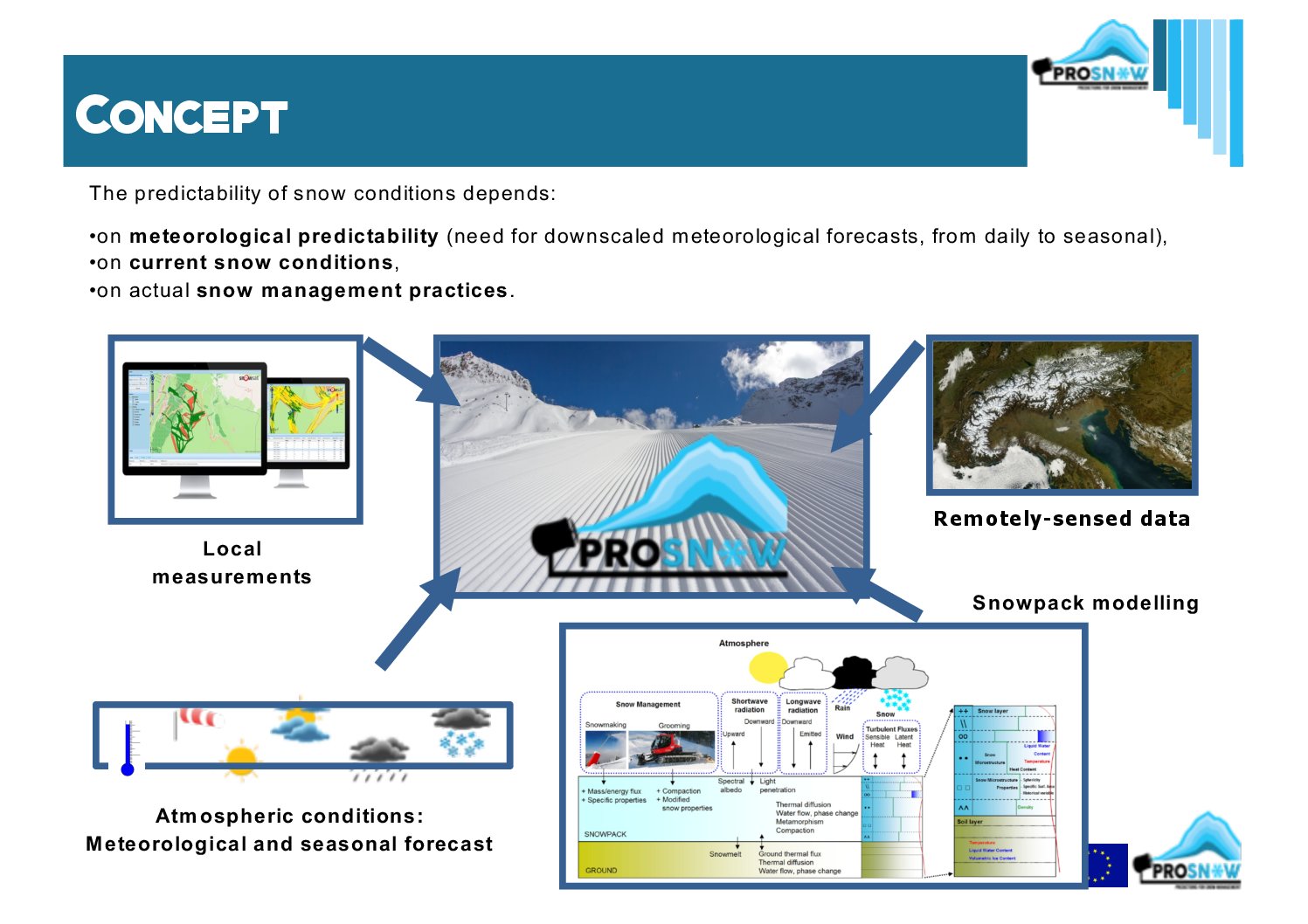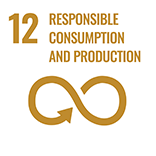PROSNOW, a novel climate service enabling real-time optimization of snow management in mountain ski resorts

Summary
PROSNOW is a prediction model for meteorological and snow conditions in ski resorts. It enables real-time optimisation of grooming and snowmaking in ski resorts, thereby supporting their activities under increasingly challenging operating conditions due to climate change.
Ski tourism faces climate-related challenges at various interconnected time scales: how to efficiently adapt to ongoing climate change, now and in the future, using effective methods to cope with variable and declining snow cover, without committing to detrimental effects to the local and global environment in the long term? Several studies have documented the long term impacts and risks of various climate change scenarios on snow reliability in ski resorts in various mountain areas, and the need for the development of early warning systems to enhance the adaptation capacity of socio-economic sectors under current and future climate conditions.
In this context, the initial motivation of the PROSNOW project was to contribute to developing early-warning systems to better cope with the impact of the variability of meteorological and snow conditions on ski resorts operating conditions, and better adapt to increasingly challenging conditions in the future. One key requirement for early-warning systems is the provision of impact-based forecasts, at relevant time scales, designed to adapt operations, in real-time, to expected upcoming conditions, in order to reduce their potentially negative impacts, or benefit from upcoming opportunities. Given the main characteristics of the ski tourism business, in particular snow production in early winter, potentially annihilated by warm spells, anticipating meteorological and snow conditions at time scales from days to weeks, to months, is the relevant time scale to optimize snow management in mountain ski resorts.
The core concept of PROSNOW, developed through the EU H2020 PROSNOW from 2017 to 2020, was to focus on the snow cover on ski slopes, in the most integrative possible way, at time scales relevant to real-time decision making for snow management. Indeed, ski resorts managers are used to rely on weather forecasts, and intellectually combine this information with observations of the snow cover within the ski resort, taking into account their knowledge about snow processes. Snow cover modelling, i.e. the direct simulation of the state of the snow cover based on past and/or future meteorological conditions, has not been used for real-time ski resorts management hitherto, and this is the main gap that the PROSNOW project has contributed bridging. Indeed, one of the main benefits of numerical models is their capacity to integrate various sources of information and provide quantitative predictions beyond what the human mind can intuitively infer.
The project PROSNOW has brought together 13 academic and industrial partners operating in the field of the mountain snow cover in more or less direct relationship with ski tourism, but with different perspectives on how to approach this medium. Numerical snow cover models simulate the evolution of the snow cover, based on the time evolution of meteorological conditions (temperature, precipitation, wind speed, incoming radiation etc.), and the PROSNOW project has enabled further development of such models to account for grooming and snowmaking in a physically sound and operationally meaningful manner (Hanzer et al., 2020). This was developed thanks to the interactions between the diversity of partners involved in PROSNOW. Such models need to be fed by meteorological information, and the PROSNOW project has consolidated methods for feeding such snow cover models using not only past observations but also forecasts across weather (days to weeks) to seasonal (weeks to months) time scales. Because of the various sources of uncertainty involved, so-called “ensemble forecasting” was implemented, which provides a range of meteorological scenarios at various lead times, based on the output of numerical weather models, based on which probability ranges for the upcoming conditions can be inferred.
The PROSNOW system developed during the project combines an ensemble of meteorological and seasonal forecasts with an ensemble of model configurations, enabling to quantify the impact of various snow management tactics (e.g. various snow productions approaches, including no production), and therefore provide objective information to guide decision making in real time. Based on a detailed representation of the geographical organization of the ski resort, the system makes it possible to identify the subsectors of the ski resorts with most challenging snow conditions, and provide forecast of water consumption for snowmaking associated with each option. Thanks to snow cover modelling, the system makes it possible to provide outputs directly in the form of snow cover height or snow mass, which can be displayed on a ski resort map and compared to in-situ measurements. In fact, in-situ measurements of snow depth (using sensors embarked on grooming machines) or snow production can be used, in the PROSNOW system, to adjust the simulations and enhance the realism of the results, thereby fostering adoption and uptake by the users. Functional choices relevant to the development of the main configurations handled by the system and the design of the user-facing tool were developed thanks to a co-design approach involving pilot ski resorts. These specifications were confirmed by a wider-ranging survey across ski resorts in the European Alps, which further indicated the strong desire by the ski tourism industry to better manage its resources and a widely-shared opinion that better and more customized forecasts could indeed save resources and optimize their use.
The PROSNOW project has developed a dedicated Advanced Programming Interface (API) for exchanging snow-related information between ski industry service providers and stakeholders, thereby enabling an acceleration of data sharing in this sector. PROSNOW has also delivered improvements of existing open-source software elements, with immediate benefits to their community of users (e.g., snow cover models, or tools for the post-processing of seasonal forecasts). Scientific results from the PROSNOW project have been published in open access journals, with several publications still under preparation. The PROSNOW service is now brought to market across various countries in Europe. See online demo : https://prosnow.org/get-to-know-prosnow.
Overview
- Implementation sites:
- Multiple countries
- Multiple locations
- Mountain region:
- European Alps, Pyrenees
- Solution scale:
- Ecosystem type(s):
- Solution type(s):
- Sector(s):
- Climate impact(s) addressed:
- Impact time-scales:
- Co-benefits:
- Implementation timeline:
- 2020
- Sendai targets:
Solution details
Main beneficiaries & outcomes
The main beneficiaries of the PROSNOW solution are ski resort managers, because the tool enables them to optimize snow management. It also benefits the broader ski tourism economy in mountain regions, in particular through enabling communication about the snow conditions across a wide range of stakeholders at the local scale (ski resorts managers, pistes managers, snowmaking managers, grooming managers, marketing, tourism office, local authorities – in particular municipalities).
Planning and implementation
The PROSNOW project was developed from 2017 to 2020 as part of a European H2020 project coordinated by Météo-France and involving 13 partners across the European Alps and 9 pilot ski resorts from 5 countries (France, Italy, Switzerland, Austria, Germany). The service developed through this project has been brought to market starting the winter 2020-2021 (with limited uptake due to Covid-19 ski resorts opening restrictions). Interest from the industry has been demonstrated.
Finance
The project was funded by an EU Horizon 2020 grant from 2017 to 2020, covering USD3.9 M from a total budget of USD4.8 M. For more information, see the project page on the European Commission website: https://cordis.europa.eu/project/id/730203/fr
Innovation
The key innovation of this project was to combine various tools and methods relevant to monitoring snow cover state on ski pistes, with modeling tools, which were then driven by customized weather forecasts, enabling ensemble forecast of snow conditions on ski pistes at time scales from 1 day to several weeks and months. A dedicated platform was developed to host the results and make them available to the users, either through an online, web-based demonstrator, or through dedicated APIs, enabling inclusion of the results into existing snow management platforms.
Performance evaluation
The project has assessed the benefit of the PROSNOW service based on feedback from pilot users after one year of testing.
Several years of implementation are required until the performance of the service can be fully evaluated.
Long term project sustainability and maintenance
The service is engaged in commercial exploitation since the winter 2020-2021 (with limited initial uptake due to Covid-19-related ski resorts closures). The exploitation is taken care of by several exploitation entities, with various levels of maturity. The initial partners of the project are bound by a Joint Ownership Agreement, which includes the intent of the partners to communication, and potentially coordinate, further developments in this field.
Capacities for design and implementation
Knowledge
The project is an innovation action under the Horizon 2020 EU research and innovation framework.
See https://cordis.europa.eu/article/id/422470-seasonal-weather-forecast-tool-enables-ski-resorts-to-better-adapt-to-climate-change
Research heavily contributed to the development of the project and service, by bringing together individual knowledge elements and tools and developing a new service on this basis. The service was fundamentally co-designed by users from ski resorts, involving various stakeholders from 9 pilot ski resorts across the European Alps, spanning different levels of responsability within ski resorts organizations.
Technology
GIS played a central part in developing and implemented PROSNOW, together with other technology capacities (snow monitoring on ski pistes, snow cover modeling, snow cover remote sensing, weather forecasting and relevant statistical post-processing etc.).
Political / Legal
The solution was developed following the initiative of its partners, which received funding from H2020. Political and legal capacities, at the local scale, did not play a large role in developing the solution – although the funding of the project was a consequence of opening a EU H2020 Call on developing climate services, which itself is a high level political decision.
Institutional
The PROSNOW service focuses mostly on local stakeholders, and enables new ways of communication between local stakeholders involved in ski tourism directly or indirectly. PROSNOW does not directly depend on local institutional capacities, but can benefit from meaningful collaboration between local stakeholders, and can improve it by providing information that can serve as a bridge between the local stakeholders.
Socio-cultural
The PROSNOW service has a clear focus on supporting ski tourism businesses. Therefore, it does not directly engage with stakeholders of the social context, although it promotes awareness to climate change in a solution-oriented way, therefore creating opportunities for meaningful dialogue between ski tourism operators and local stakeholders including NGOs.
Outlook & Scalability
Barriers and adverse effects
No specific barrier hampered the development of the PROSNOW service ; project members worked hard during the development phase from 2017 to 2020, and delivered expected outcome. The main barrier to market uptake has been the disruption induced by the COVID-19 pandemic, which lead to the partial or full closure of the ski tourism industry across the European Alps during the winter 2020-2021. It is hoped, and expected, that ski resorts will turn to using PROSNOW starting from the winter season 2021-2022 onwards.
Transformation and future outlook
It is yet too early to say whether PROSNOW has caused or supported fundamental change to CCA. However, it is clear that PROSNOW has contributed, directly or indirectly, to shape the CCA discourse for ski tourism is a manner more solution-oriented that other forms of communication. It has also enabled some conversations to happen between local stakeholders, and had contributed to raising awareness about CC, its impact, and ways forward. In fact, despite labeled as an “early warning system”, operating at the scale of days to months, PROSNOW enables bridging the gap to longer time scales and supports adaptation of the mountain tourism economy in a broad sense, including diversification of tourism assets and activities.
Potential for upscaling and replication
The PROSNOW solution can technically be upscaled and ported to other mountain environments where ski tourism plays a role (Northern Europe, other European mountain ranges, US, Japan etc.). The combination of monitoring and forecasting techniques implemented for PROSNOW can also be relevant to other mountain (or non-mountain) issues, such as water management et agriculture. Replication will probably be considered once the system and service demonstrate its value in its starting area (European Alps and Pyrenees), and will require finding suitable partners and leaders ready to invest in developing the service further. Current, PROSNOW has not been endorsed in a national CCA plan or strategy.
Finally
Acknowledgments
This project has benefited from funding from the European Union’s Horizon 2020 research and innovation programme under grant agreement No 730203.
CCA in mountains
Combination of time scales (from weather to climate change) always help anchoring climate change in processes/phenomena that people/businesses/sectors can relate to. Also, impact-based approaches maximize uptake and understanding of the magnitude of the change and their impacts – this is obvious, but relating only to changes in terms of °C local temperature increase (e.g. annual average) makes little sense for most stakeholders.
Contacts of key institutional partners involved with the solution planning and implementation
Météo-France : [email protected], project coordinator.
Key references/links
PROSNOW website: https://prosnow.org/
PROSNOW project page on the European Commission website: https://cordis.europa.eu/project/id/730203/fr
Project material can be found here: https://prosnow.org/project-material/
The PROSNOW online demo is available here: https://prosnow.org/get-to-know-prosnow.
Other references
Lucas Berard-Chenu, Jonathan Cognard, Hugues François, Samuel Morin and Emmanuelle George: Do changes in snow conditions have an impact on snowmaking investments in French Alps ski resorts?Published in International Journal of Biometeorology. 28.05.2020
Martin Gerbaux, Pierre Spandre, Hugues François, Emmanuelle George and Samuel Morin: Snow Reliability and Water Availability for Snowmaking in the Ski resorts of the Isère Département (French Alps), Under Current and Future Climate Conditions. Published in Journal of Alpine research, 2020.
Bruno Abegg, Samuel Morin, Osman Cenk Demiroglu, Hugues François, Michael Rothleitner, Ullrich Strasser. Overloaded! Critical revision and a new conceptual approach for snow indicators in ski tourism. Published in International Journal of Biometeorology. 04.2.2020
Florian Hanzer, Carlo Maria Carmagnola, Pirmin Philipp Ebner, Franziska Koch, Fabiano Monti, Mathias Bavay, Matthias Bernhardt, Matthieu Lafaysse, Michael Lehning, Ulrich Strasser, Hugues François, Samuel Morin: Simulation of snow management in Alpine ski resorts using three different snow models. Published in Cold Regions Science and Technology. 15.1.2020
Thomas Grünewald, Fabian Wolfsperger, and Michael Lehning: Snow Farming: Conserving snow over the summer. Published in The Cryosphere (Journal). 12.1.2019
Florian Hanzer, Carlo Carmagnola, Pirmin Ebner, Mathias Bavay, Mathieu Lafaysse, Michael Lehning, Ulrich Strasser, Hugues François, Samuel Morin: Simulating snow conditions in ski resorts with the physically based snowpack models AMUNSDEN, Crocus, and SNOWPACK/Alpine 3D. Published in International Snow Science
Workshop Proceedings, 2018.
Samuel Morin, Ghislain Dubois, and the PROSNOW Consortium: PROSNOW: Provision of a prediction system allowing for management and optimization of snow in Alpine ski resorts. Published in International Snow Science Workshop Proceedings, 2018.
Carlo Carmagnola, Samuel Morin, Matthieu Lafaysse, Mattthieu Vernay, Nicolas Eckert, Lauriane Batté, Jean- Michel Soubeyroux, Christian Viel: Combination of climatological information and meteorological forecast for seamless prediction of Alpine snow conditions. Published in International Snow Science Workshop Proceedings, 2018.


(0) Comments
There is no content